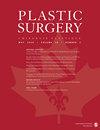An Assessment of Quality-of-Life Following Tissue Expansion in Pediatric Patients
IF 0.6
4区 医学
Q Medicine
引用次数: 0
Abstract
Introduction: There is limited data on the effects of tissue expansion (TE) surgery on quality-of-life (QOL) in pediatric patients. Evidence-based information may help clinicians, patients, and their families with treatment decision-making and post-operative expectations. This study explores QOL following TE in pediatric patients. Methods: A post-intervention QOL survey and retrospective chart review was performed. Patients who underwent TE at a pediatric tertiary hospital between October 2004 and March 2020 completed the Glasgow Children's Benefit Inventory or the Glasgow Benefit Inventory. Total scores range from −100(worsened QOL) to +100(improved QOL). Participants were also asked if they would recommend TE to other patients with the same indication. Results: The response rate was 38% (n = 20; 14 females, 6 males). The median QOL score was +17[−2,+49]. Higher QOL scores were found for TE indications of scar (+49) and alopecia (+40), compared to giant congenital melanocytic nevus (−2). Higher scores were also associated with shorter time in active treatment ( r = −0.65) and fewer complications ( r = −0.56). 18/20 participants would recommend TE. Participants whose QOL improved (n = 11, 55%) reported increased self-confidence, fitting in with peers, and improved function. Participants with unchanged or decreased QOL (n = 9, 45%) described a negative experience with residual scarring. However, 7/9 with unchanged or decreased QOL would still recommend TE. Conclusions: This preliminary descriptive study demonstrated variable QOL following TE. Patient and treatment-related factors impact QOL outcomes. Despite the range in QOL outcomes, the majority of participants would recommend TE. Further research evaluating QOL following TE is necessary to better understand this relationship.评估小儿患者组织扩张后的生活质量
简介:有关组织扩张(TE)手术对儿科患者生活质量(QOL)影响的数据十分有限。基于证据的信息可帮助临床医生、患者及其家属做出治疗决策和术后预期。本研究探讨了儿童患者接受组织扩张术后的生活质量。方法:进行干预后 QOL 调查和回顾性病历审查。2004 年 10 月至 2020 年 3 月期间在一家儿科三级医院接受 TE 的患者填写了格拉斯哥儿童受益量表或格拉斯哥受益量表。总分从-100(生活质量恶化)到+100(生活质量改善)不等。参与者还被问及是否会向其他有相同适应症的患者推荐 TE。结果:回复率为 38%(n = 20;14 名女性,6 名男性)。QOL 评分中位数为 +17[-2,+49]。与巨大先天性黑素细胞痣(-2)相比,TE适应症疤痕(+49)和脱发(+40)的QOL评分更高。较高的评分还与较短的积极治疗时间(r = -0.65)和较少的并发症(r = -0.56)有关。18/20的参与者推荐使用 TE。生活质量有所改善的参与者(11 人,55%)表示自信心增强,能够融入同龄人,功能也有所改善。质量、生活质量不变或下降的参与者(9 人,占 45%)对残留瘢痕有负面体验。不过,7/9 的 QOL 未变或下降者仍会推荐 TE。结论:这项初步描述性研究表明,TE 后的 QOL 存在差异。患者和治疗相关因素会影响 QOL 结果。尽管 QOL 结果存在差异,但大多数参与者仍会推荐 TE。为了更好地理解这种关系,有必要对 TE 后的 QOL 进行进一步的评估研究。
本文章由计算机程序翻译,如有差异,请以英文原文为准。
求助全文
约1分钟内获得全文
求助全文
来源期刊

Plastic Surgery
SURGERY-
CiteScore
0.67
自引率
0.00%
发文量
0
审稿时长
6-12 weeks
期刊介绍:
Plastic Surgery (Chirurgie Plastique) is the official journal of the Canadian Society of Plastic Surgeons, the Canadian Society for Aesthetic Plastic Surgery, Group for the Advancement of Microsurgery, and the Canadian Society for Surgery of the Hand. It serves as a major venue for Canadian research, society guidelines, and continuing medical education.
 求助内容:
求助内容: 应助结果提醒方式:
应助结果提醒方式:


